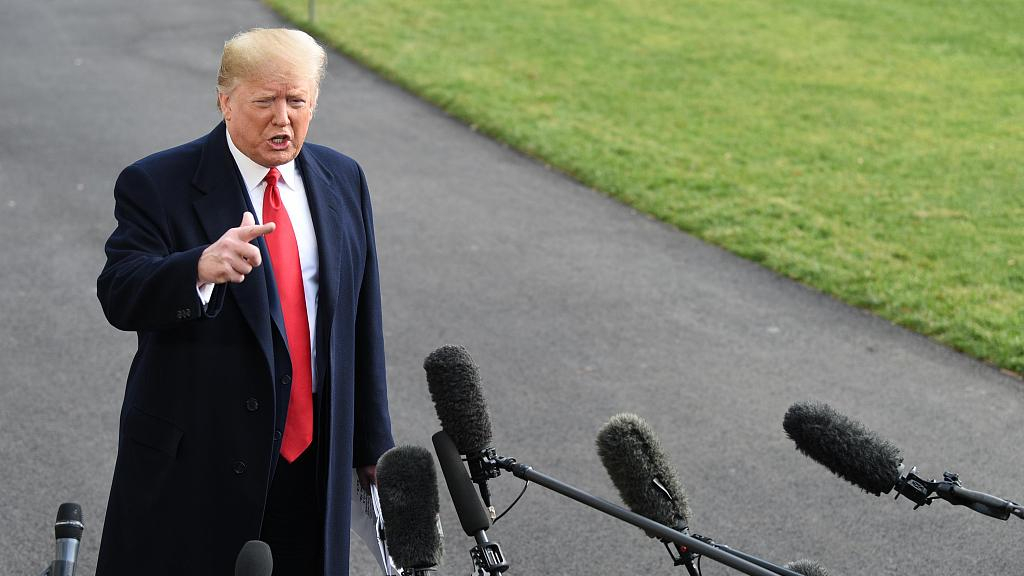
Editor's note: Chris Hawke is a graduate of the Columbia Graduate School of Journalism and a journalist who has reported for over two decades from Beijing, New York, the United Nations, Tokyo, Bangkok, Islamabad and Kabul for AP, UPI, and CBS. The article reflects the author's views, and not necessarily those of CGTN.
Many commentators in the United States are noting that the very fabric of society is being torn apart under the administration of President Donald Trump. Truth and lies are being treating as being relative and interchangeable.
Public servants are slandered, rather than respected for their service and admired for their work in building and protecting the nation. Long-term foreign policy planning and execution is being replaced by spectacle intended to help with the next election. Duty to the constitution is cast aside, and holding power by any means becomes the only goal.
How did things degenerate to this state?
Elias Canetti, the Nobel Prize winning author, wrote in the book Crowds and Power that the structure of a liberal democracy resembles two opposing armies going to war.
The winner of each individual battle is based on who has the biggest "army."
He writes, "No one has ever really believed that the majority decision is wiser because it has received the greater number of votes… The member of an outvoted party accepts the majority decision, not because he has ceased to believe in his own case, but simply because he admits defeat. It is easy for him to do this because nothing happens to him: He is not punished in any way for his previous opposition."
A democratic system functions because each side knows that if they are patient, their turn in power will come. They can accept laws being made that they disagree with, because they know one day, in the not too distant future, they will get a chance to make their own laws.
However, if one side begins to feel a defeat will cause them to lose everything, the system starts to fray, and eventually shreds.
This is happening right now in the United States.
In a narrow context, the threat is rising that previous leaders will be punished if they lose power.
Candidate Trump came to power amid chants calling for the previous Secretary of State to be imprisoned for her handling of her email – something that Trumps' daughter, son-in-law, and six top officials have done since.
Now that Trump is president, crowds have started chanting, "Lock him up!"
Trump is facing charges and allegations that, if proved true, could certainly land him in prison after he leaves office. Some are related to actions before he was president, and some are outlined in the Mueller report and current impeachment proceedings.
In this impeachment battle, Trump is not only fighting to retain power, he is also fighting for his freedom.
For Canetti, the basis of a liberal democratic system collapses under these circumstances.

David Holmes, counselor for political affairs at the U.S. Embassy in Ukraine, testifies during the House Intelligence Committee hearing on the impeachment inquiry of President Trump in Longworth Building, November 21, 2019. /VCG Photo
David Holmes, counselor for political affairs at the U.S. Embassy in Ukraine, testifies during the House Intelligence Committee hearing on the impeachment inquiry of President Trump in Longworth Building, November 21, 2019. /VCG Photo
In the larger context, as the United States becomes more urban and cosmopolitan, the current Republican coalition is facing the threat of permanently losing power. Demographic and societal shifts are not in favor of the party.
Already, the Republicans are in power simply due to quirks in the design of the American system that were intended to make sure more populous states don't overwhelm or take advantage of less populous ones.
In the 2000 election, President George W. Bush won despite his opponent Al Gore receiving 543,895 more votes. In the 2016 election, Trump won despite his opponent Hillary Clinton winning almost three million more votes.
Republicans control the Senate because it is tilted toward rural areas. Wyoming has a population under 600,000, while California has 40 million. But both get two senators.
This matters because sometime in the near future, the tradition Republican Party coalition, and the values it embraces, will become a permanent minority.
Demographers predict the white population will become a minority around 2045. Support for organized religion, a key component of the Republican base, is rapidly diminishing. Similarly, support for gay marriage, seen as a threat by some elements of the Republican base, is undergoing a generational shift.
People in urban areas, which are growing, are much more likely to support gun control than people in rural areas, who see regulation as a threat to their way of life.
In short, the current Republican coalition's time is short. This can explain why they would support a man like Trump, who they see as personally objectionable but a strong brawler in their corner amid a fight to the death.
It also explains why Republicans are willing to shred the reputation of honorable civil servants, attack their colleagues, ignore longstanding Congressional traditions, and generally burn down the nation's house in order to retain power and attain some short-term goals. For the current Republican coalition, there is no long term.
While Trump's liberty may literally be in danger when he leaves power, the cultural power of religious, anti-gay rights, pro-gun, rural whites is slipping away forever, and they can feel it.
A political representative will "act quite differently if his life was endangered," says Canetti. That is what we are witnessing in the United States right now.
(If you want to contribute and have specific expertise, please contact us at opinions@cgtn.com)